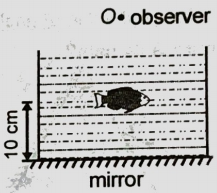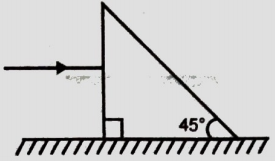Two convex lenses of focal lengths \(10\) cm and \(30\) cm are kept at a separation of \(20\) cm. Then the correct statement is:
1.
The effective focal length is \(15\) cm.
2.
Chromatic aberration is minimized.
3.
Combination behaves like a convergent lens.
4.
All of these.
A plane mirror is placed at the bottom of a fish tank filled with water of refractive index . The fish is at a height 10 cm above the plane mirror. An observer O is situated vertically above the fish outside. The apparent distance between fish and its image for the observer is-

1. 15 cm
2. 30 cm
3. 35 cm
4. 45 cm
If one surface of a biconvex lens is silvered, then it behaves as
(1) A concave mirror of focal length
(2) A concave mirror of focal length
(3) A convex mirror of focal length
(4) A concave mirror of focal length
An astronomical telescope has an angular magnification of 20 in its normal adjustment. The focal length of the eyepiece is 4 cm. Distance between objective and eyepiece is :
1. 80 cm
2. 84 cm
3. 76 cm
4. 90 cm
A liquid of refractive index is placed between two identical planoconvex-lenses touching each other at their spherical surfaces of radius R. If the refractive index of the lens is 1.50, then the lens behaves
(1) Convergent with power P=
(2) Convergent with power P=
(3) Divergent with power P=
(4) Divergent with power P=
The thickness of a plano-convex glass lens in the middle is 1.5 cm. Viewing from the flat side the thickness of the lens at the centre will appear (refractive index of glass is 1.5) to be
1. 1.5 cm
2. 1.0 cm
3. 2 cm
4. 0.5 cm
A ray of light incident on an equilateral prism at an angle of incidence i. The deviation produced by prism will be maximum when angle i is [take ]
(1) 30
(2) 45
(3) 60
(4) 90
A lens of focal length in air consists of a glass of refractive index . If is its focal length in a liquid of refractive index , then for :
(1)
(2)
(3)
(4)
A beam of light consisting of red, green and blue colours in incident on a right-angled prism as shown. The refractive index of the material of prism for red, green and blue wavelength are 1.39, 1.44 and 1.47 respectively. Which of the three colours will come out off the right face of the prism?

1. Green
2. Red
3. Blue
4. No colour will be separated
If four convex lenses, given to you have focal lengths , then which of the following combination will you prefer to form a compound microscope?
(1) as objective and as eye-lens
(2) as objective and as eye-lens
(3) as objective and as eye-lens
(4) as objective and as eye-lens


